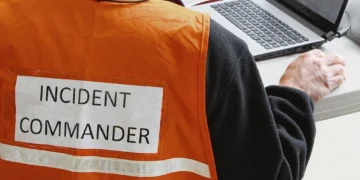Which Command Staff Member Approves The Incident Action Plan?
A. Public Information Officer
B. Incident Commander
D. Safety Officer
The answer is (B): Incident Commander | Incident Commander approves the incident action plan.
Below is the comprehensive information about this, you can read it below;
The Incident Action Plan (IAP) is a crucial component of incident management, providing a comprehensive framework for coordinating response efforts.
The approval of the IAP rests with the Incident Commander (IC), who plays a central role in managing incidents.
This article explores the Incident Action Plan, and its staff, and focuses on the IC’s rules, duties, responsibilities, and capabilities within the incident management structure.
Incident Action Plan (IAP)
The Incident Action Plan is a strategic document that outlines the objectives, tactics, resource allocation, and operational priorities for managing an incident.
It provides guidance for all response personnel, enabling effective coordination, and ensuring a unified approach to incident management.
The IAP is developed through collaboration, involving input from subject matter experts, agency representatives, and relevant stakeholders.
Incident Commander (IC)
The Incident Commander is a key position within the incident management structure. They are responsible for overall management, coordination, and decision-making during an incident.
The IC is typically the individual with the highest authority and possesses the necessary knowledge, skills, and experience to lead response efforts.
Rules And Duties Of The Incident Commander
1. Overall Incident Management
The IC assumes overall responsibility for managing the incident. They establish command, coordinate resources, and make strategic decisions to ensure the effective and efficient use of available assets.
2. Risk Assessment And Safety
The IC assesses risks associated with the incident and takes appropriate measures to ensure the safety of responders, affected populations, and the environment.
They establish and enforce safety protocols and guidelines.
3. Strategic Decision-Making
The IC analyzes the incident, considers available resources, and makes informed decisions regarding objectives, priorities, and resource allocations.
They evaluate information from various sources and adapt the response strategy as needed.
4. Coordination And Communication
The IC coordinates response efforts among multiple agencies, departments, and organizations.
They establish communication channels, facilitate information exchange, and maintain situational awareness throughout the incident.
5. Resource Management
The IC oversees the allocation and utilization of resources. They ensure that resources are effectively deployed to support incident objectives and address operational needs.
Recommended: At The Incident Scene, Who Handles Media Inquiries?
Responsibilities And Capabilities Of The Incident Commander
1. Leadership
The IC provides strong and effective leadership to guide response efforts. They inspire and motivate response personnel, fostering a positive and cohesive working environment.
2. Decision-Making
The IC possesses the authority to make critical decisions, considering available information, expert advice, and the best interests of the incident response.
They must balance competing priorities and assess the potential impacts of their decisions.
3. Adaptability
The IC must remain flexible and adaptable in response to changing incident conditions.
They continually reassess the situation, adjust objectives, and modify the IAP to ensure its ongoing relevance and effectiveness.
4. Interagency Collaboration
The IC collaborates with other agencies, departments, and organizations involved in the incident response.
They foster cooperation, facilitate coordination, and ensure a unified approach to incident management.
5. Public Information And Liaison
The IC serves as a point of contact for public information and liaises with external stakeholders, such as the media, public officials, and affected communities.
They provide accurate and timely information regarding the incident and response efforts.
Conclusion
The Incident Commander holds the authority to approve the Incident Action Plan, a crucial document for effective incident management.
They play a central role in overseeing response efforts, making strategic decisions, coordinating resources, and ensuring the safety of responders and affected populations.
The IC’s rules, duties, responsibilities, and capabilities encompass various aspects of incident management, including leadership, decision-making, coordination, and adaptability.
By fulfilling these responsibilities, the IC guides response operations, fosters collaboration, and facilitates the successful resolution of incidents.












Wonderful beat ! I wish to apprentice while you amend your web site, how could i subscribe for a blog web site? The account aided me a acceptable deal. I had been a little bit acquainted of this your broadcast provided bright clear idea